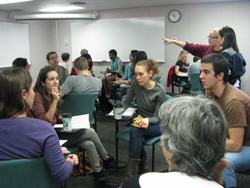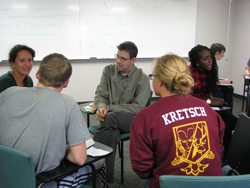AIDS Course Inspires Students to Use Science to Serve Society
November 29, 2012Harvey Mudd College students describe the HIV/AIDS course taught by Professor of Chemistry and Biology Karl Haushalter as life changing.
“AIDS: Science, Society and Service” combines the science of the HIV infection and its treatment with the social, historical and political context of the disease. The interdisciplinary class features guest speakers from the community, multi-generational classmates (two retired AIDS workers audit the course and actively discuss their experiences) and an unusual final exam: organizing a community service project.
“HIV changes quickly, so you have to use your technical knowhow, but it’s not enough to have just the science,” said Haushalter. “We’ve had potent antiviral medicine that can suppress the virus available since the late 1990s, but 2.5 million people still die every year from the disease and that’s economics and politics. Unless we also get a grip on the social aspects we’re not going to be able to really end this once and for all.”
Each week, class sessions alternate between a science day and a social context day. Students learn how the virus replicates itself, how the immune system attacks it and ultimately fails, and how present treatments function. Along with the science, they study the consequences of the disease and the current race and health disparities involved in its treatment. For example, recent sessions focused on why African Americans, who comprise about 12 percent of the nation’s population, account for about half of new HIV infections and are more likely to die from AIDS.
“I love how our class works between disciplines. When we’re learning about one topic, the other isn’t far from our minds,” said Julia Lee ’14. “I also like that we have guest speakers who have discussions with our class. Most recently, we spoke with a panel of HIV-positive men, which was really helpful in putting a human face on everything that we’ve learned.”
The class spurs students to think about the challenges scientists face when confronting complex epidemics such as AIDS and tuberculosis, and the ways scientists can hinder—or greatly contribute to—the public good.
“We read about scientists who were heroes and some who were much less heroic and really fell short,” said Haushalter. “It’s been useful for the students to see how scientists have responded under very difficult circumstances.”
This year, Haushalter added a community-service component to the course. Students work with local HIV/AIDS agencies and nonprofits to design a service project, which they present for their final exam. Students taking the class next year can carry out that project or design their own.
Christian Stevens ’14 and his group are working with a nonprofit that runs a summer camp for HIV-infected children and young adults and wants a way to maintain year-round contact with campers. The students are designing a mentoring project in which students from The Claremont Colleges organize fun activities and homework help for the campers during the academic year.
“Working on this project, I realized that being HIV positive does not necessarily dominate these individuals’ lives,” said Stevens. “We have realized that the service project shouldn’t be so specific to just helping them deal with HIV, but in helping a lot of these individuals with other struggles they may be dealing with that HIV tends to amplify.”
Stevens also works in Haushalter’s lab, researching new gene therapy approaches for treating HIV/AIDS. Stevens planned to pursue a career in pure research, but now wants to do a combined MD/PhD program so that he can work with patients directly, particularly in clinical trials. “Being able to bring my work directly to the patient will help me better understand the impact of my research as well as help me to shape my future research,” said Stevens.
Alumni of Haushalter’s course have gone on to pursue AIDS research, vaccine development and HIV prevention work in the United States and Africa. It is Professor Haushalter’s hope, though, that the lessons learned in the AIDS class extend beyond just this one disease. “Ultimately, this class is about being more aware as a scientist about the role that you can play as an agent for social change. Much of this work involves learning how to listen, to understand people different from yourself, and finding creative ways to apply your scientific skills to pressing societal problems.”


